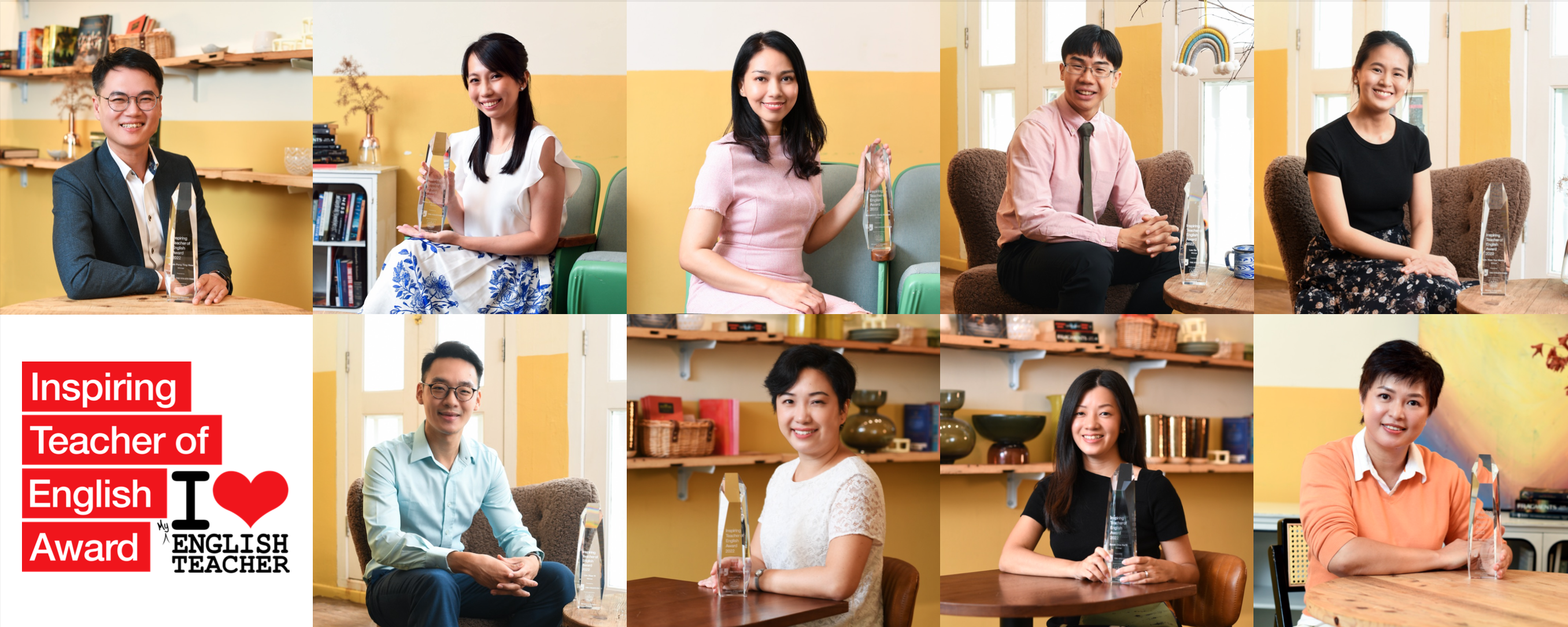
![]()
Winners of the 2022 Inspiring Teacher of English Award
Congratulatory Speech by Mr Chan Chun Sing,
Minister, Ministry of Education
Press Release for Inspiring Teacher of English Award 2022
ITEA 2022 - Teaching Award Category
Primary School Category
Mr Edwin Pang Ting How
Xinmin Primary School
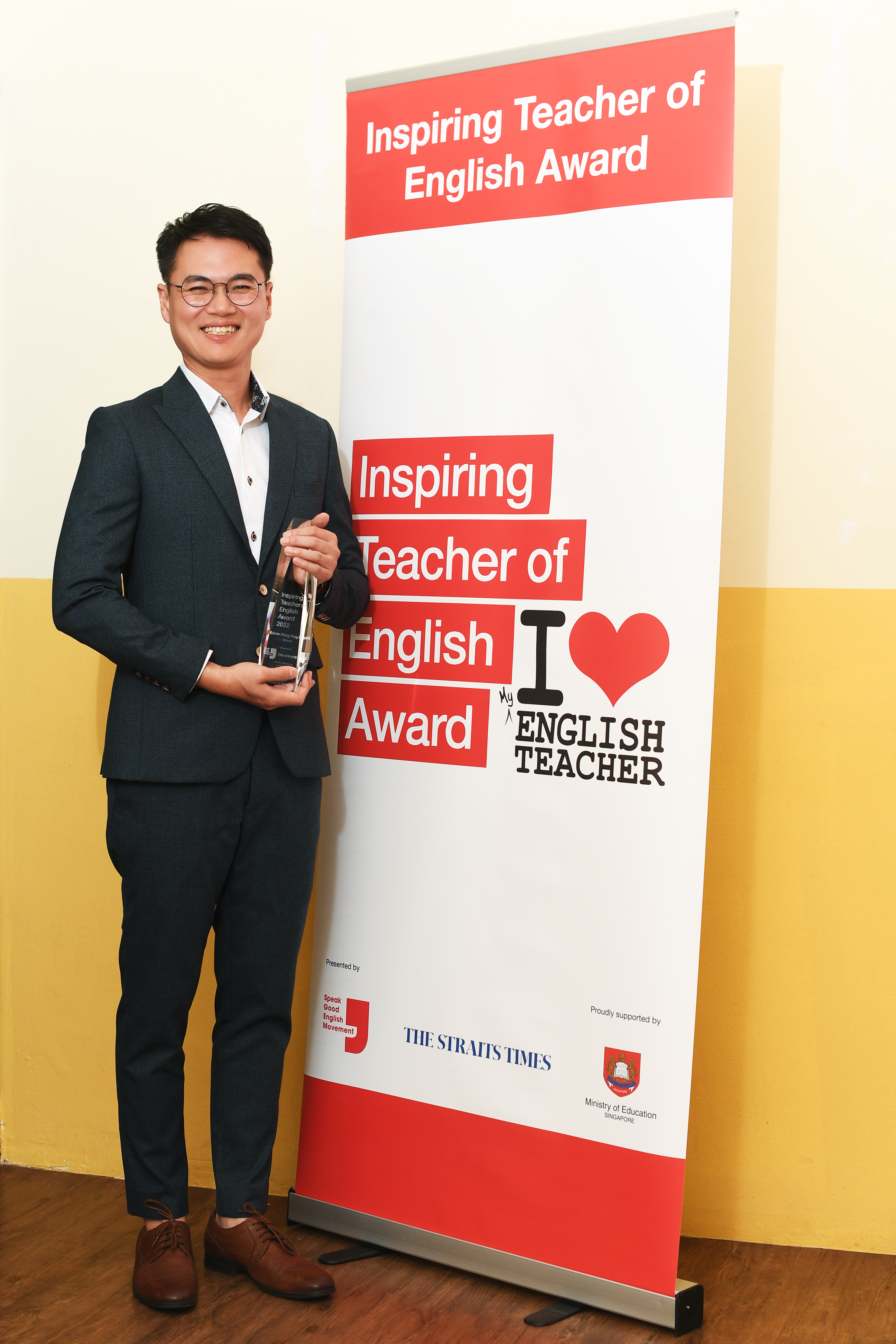
“As I reflect on my journey as an English Language teacher, the words ‘craft’ and ‘ownership’ recur. I view language teaching as a creative endeavour which evolves through continual refinement of our craftsmanship. We should be anchored in the knowledge bases that underpin our professional practice, and our interaction with our students and their varied contexts. Shokunin kishitsu, loosely defined as the mastery of one’s profession, the pride and joy it entails, as well as responsibility to the well-being of society also comes to mind. This philosophy guides my practice as a teacher of English.
My heart sings when students take ownership of language learning. During the pandemic, I decided to take a novel approach to developing oracy skills for my graduating class. I explored the use of various topics of interest and engaged my students in debates. In online lessons facilitated via Zoom, I guided and supported them in the process of research, lengthy but fruitful collaborative discussions and passionate debates. The students’ growth – to become more self-directed language learners, active contributors and concerned citizens – reduced me at times to tears. These moments are what make me take pride as an English Language Teacher.”
Watch Video
Mdm Heng Jing Hui, Melody
Bendemeer Primary School
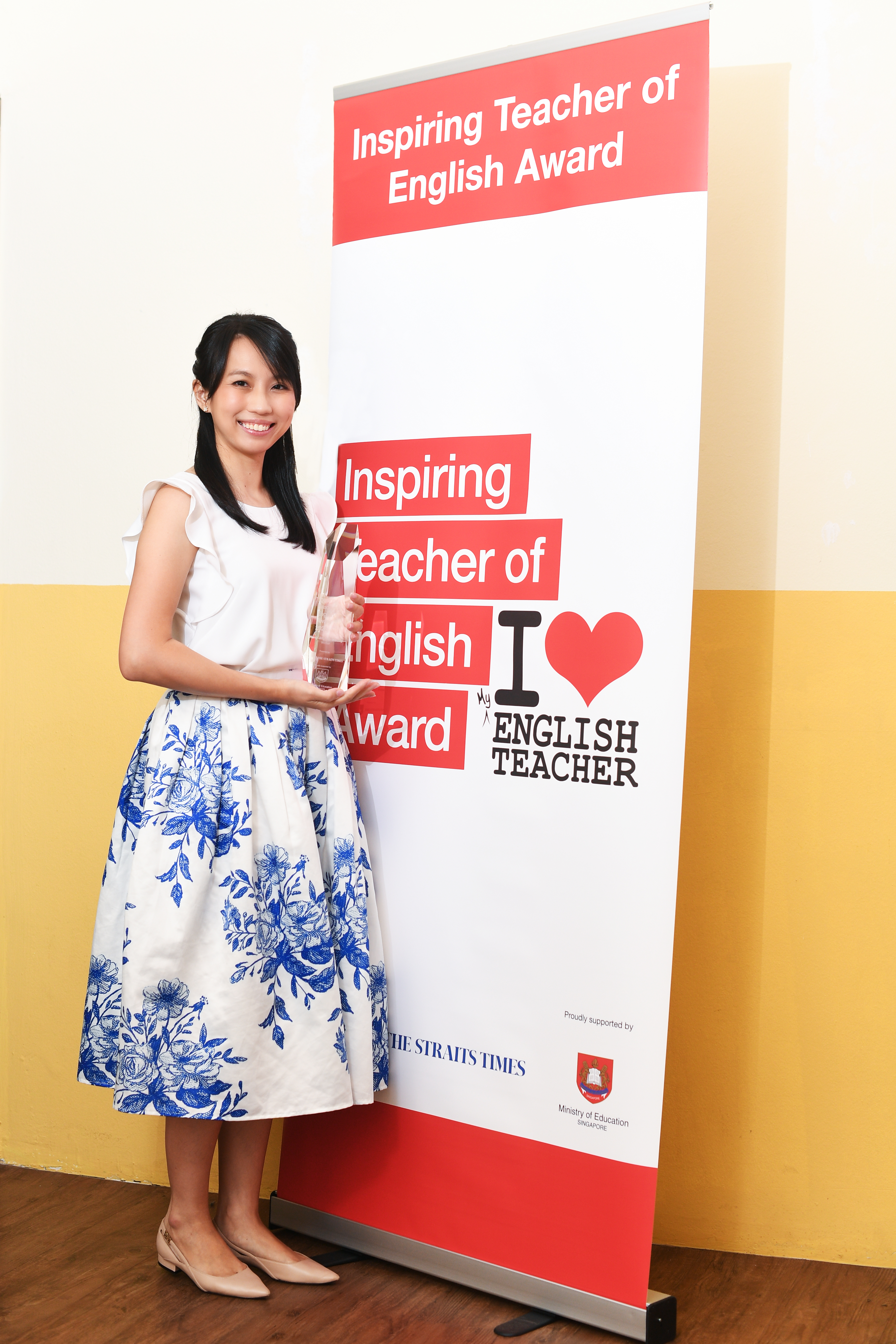
“I am a teacher; I teach.” As an English Language teacher, I have always been guided by this motto as it encapsulates what teaching means and motivates me to make every lesson interesting and unforgettable for all my students. I believe learning should be experiential and enjoyable: this is when English comes alive for my students and they are inspired to love the subject that is so dear to me.
I fondly recall many moments in my teaching career when this happens. Once, to enable my students to recount their personal experiences, I organised a ’pyjamas party’ for them, complete with a bedtime story, circle time, a dance-off and a quick ’nap’. After that, the students’ recounts of their experience were some of the best they had ever written! Some parents told me that their children raved about their experience of learning for weeks. One student even kept a photo of the ‘pyjamas party’ in his wallet for years!
Teaching is not a bed of roses; it can be emotionally taxing. However, the sense of fulfilment I derive from seeing my little ones’ eyes light up when I enter the classroom, or when students tell me English is their favourite subject, makes it all worthwhile.”
Watch Video
Mdm Norashikin Binte Hassan
Qihua Primary School
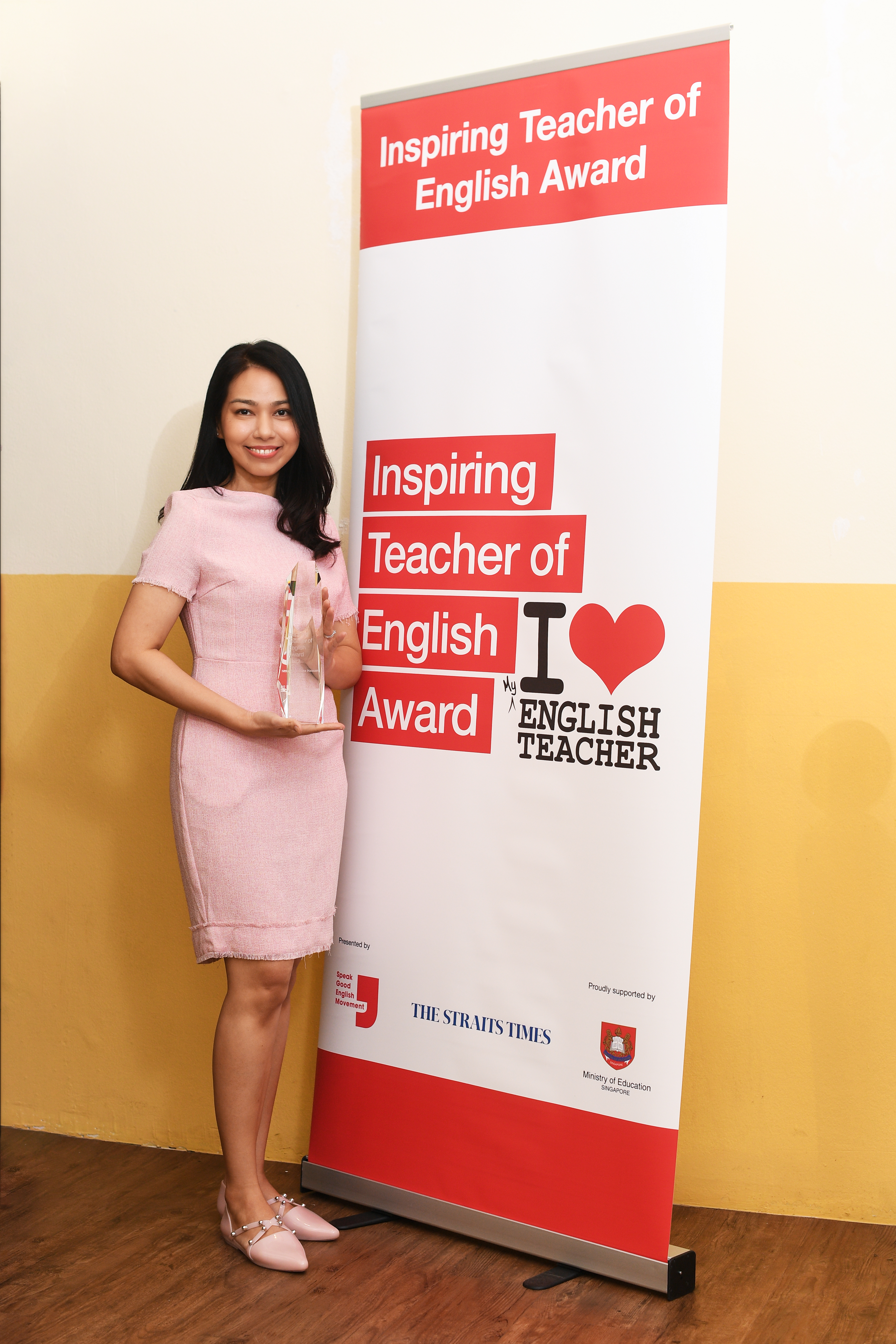
“I believe that learning is an active process that promotes thinking. Learning should also be enjoyable so that it can be a lifelong endeavour. These beliefs lead me to put students at the centre of my teaching. Hence, I strive to differentiate my teaching of English to meet my students’ different learning needs and interests. I also meaningfully and purposefully employ technology in my lessons. This is done to encourage collaborative learning through exploratory talk that is focused on achieving the learning outcomes in the English Language classroom.
Teaching English is meaningful to me because I can make a positive impact every day. Apart from building my students’ knowledge and skills in the language, there are countless opportunities to inculcate values and nurture attitudes and dispositions towards learning that will set them up to be self-directed learners.
When I was a young learner, English gave me a window to the outside world, which I discovered was also a mirror into my own. I relished how my mind was stimulated by learning the language as it enabled me to vicariously make personal connections with characters and their experiences. It is my wish for students to experience a similar appreciation and enjoyment in their learning and use of the language. I hope that they, too, will be able to engage meaningfully and joyfully with people, ideas and the world, thanks to their growing ability to communicate effectively in English.”
Watch Video
Secondary School Category
Mr Lee De Yi
Swiss Cottage Secondary School
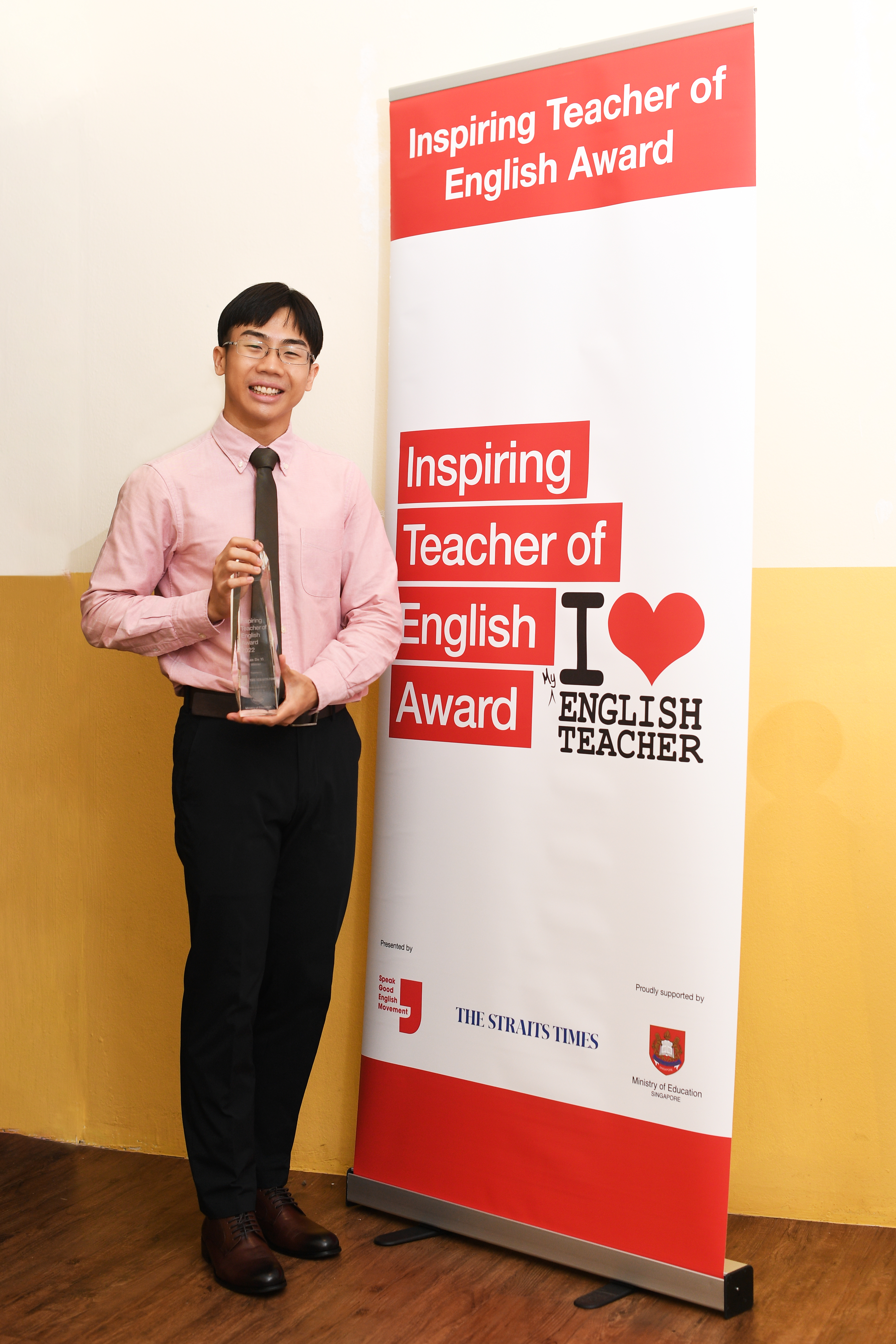
“I believe in learner-centricity and often reflect on what it means. To me, it is a focus on humanising learning so that it is contextualised, creative and authentic. I love teaching because I love learning. I often take the perspective of students and ask questions such as: What piques my interest? How do I stay engaged? While knowledge and skills can be taught in many ways, I champion the designing of meaningful learning experiences to bring about the joy of learning through prizing curiosity in the classroom.
Curiosity stems from a natural appetite for knowledge and understanding. I tap students’ curiosity and their cultural capital by contextualising language learning. I draw parallels between unfamiliar texts and recognisable analogies. I also leverage students’ multi-intelligences in different semiotic modes to reach out to them regardless of their progress levels, and to open up for them the possibility of vibrant intertextual explorations.
One memorable venture was an interdisciplinary learning journey to the National Gallery Singapore that I designed for my Literature students. We explored the themes in their Literature text through the lens of local art. They connected, extended and challenged their understandings through creative meaning-making. I believe the students enjoyed crafting sensitive and insightful responses as much as I enjoyed designing the learning experience.
Through making language learning contextualised, creative and authentic, I hope to empower students to connect confidently, meaningfully and responsibly with themselves, others and the world.”
Watch Video
Ms Lim Yean Yue, Gladys
Outram Secondary School
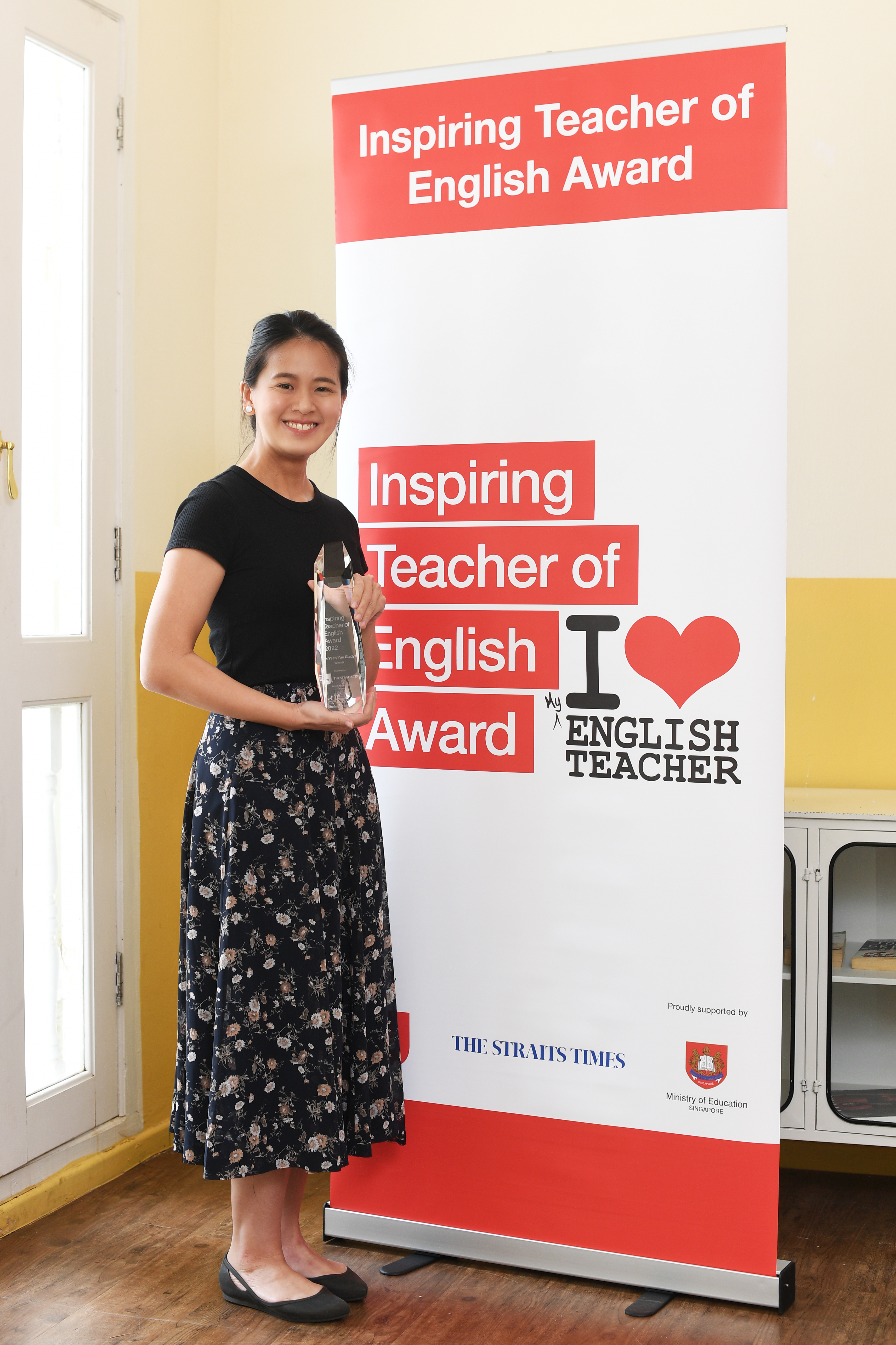
“My philosophy as an English Language teacher is that teaching, learning and assessment in the classroom have to be student-centred. As our students come from different backgrounds and experiences with English, it is important that we understand that context when we design, enact and review our lessons. This is especially crucial as we meet the challenges of inclusive classrooms made up of students from diverse backgrounds and with varied needs. I believe that inspiring teachers of English deeply understand their students’ learning needs and seek to meet their diverse needs through purposeful, meaningful and appropriate learning experiences and tasks.
Challenging and complex my roles may be, I still enjoy teaching English as it offers opportunities for me to interact and learn with students who bring with them different perspectives, needs and interests. I try to make my lessons as engaging as possible for my students. I do it by enabling them to uncover the relevance of current affairs, scaffolding their experiences of language learning so that they can savour small successes in the process, and sharing in the humour of our gaffes in the use of English. So when students tell me that they enjoy my English Language lessons, it makes everything worthwhile.”
Watch Video
Mr Lim Zhan Yi
Hwa Chong Institution
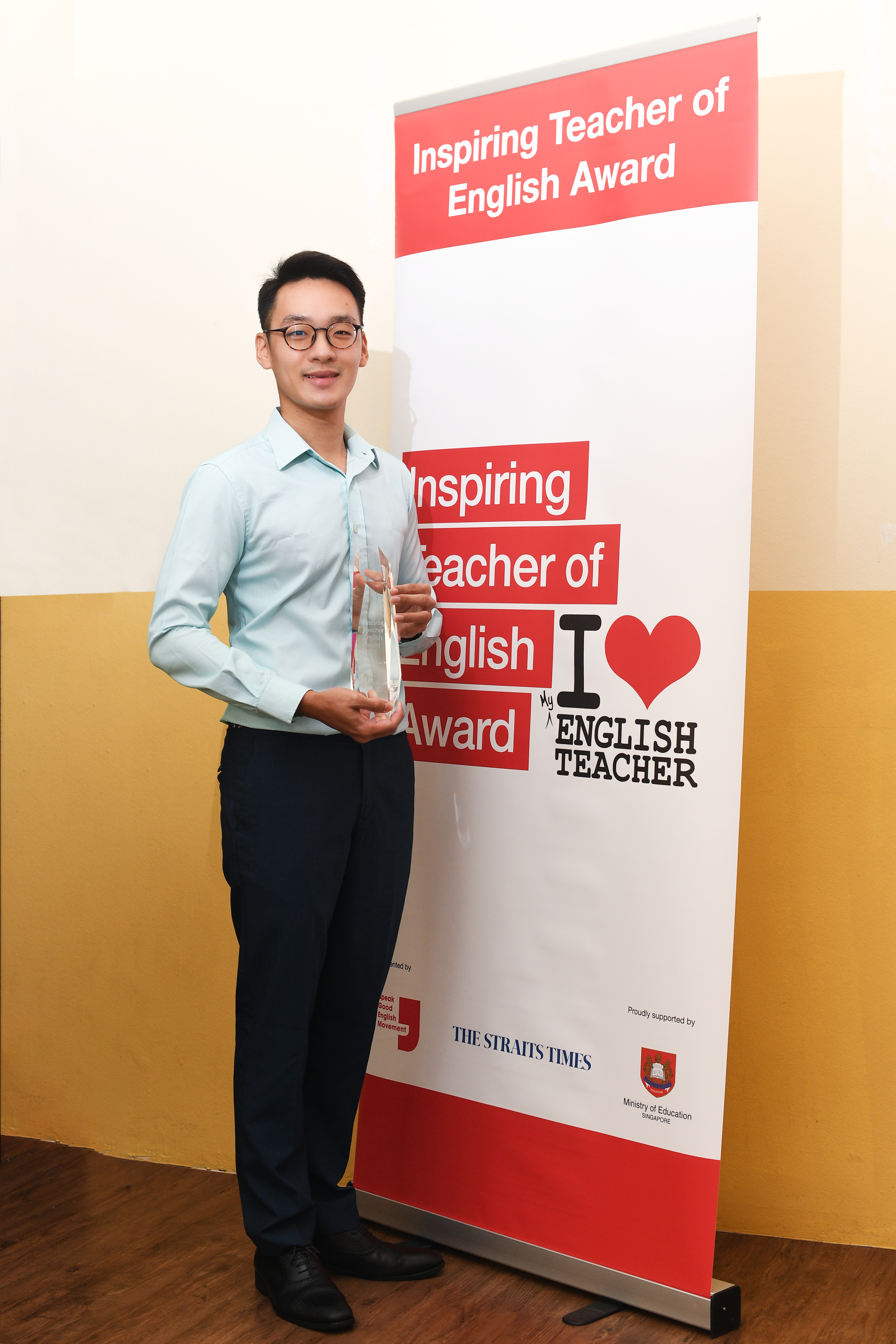
“I teach, so that I may one day become redundant to my students, for it is then that I know they have learnt to direct their own thinking.
But until then, I see my role as enabling my students to develop ‘negative capability’, a term coined by John Keats, that they may dwell in half-knowledge and unanswered questions, without the irritable reach for certainty and assurance. This gap – intrinsic to the study of Literature, but also reflective of the world we live in – is what makes teaching the subject at once exciting and terrifying.
To cultivate such dispositions requires encouraging metacognition, guiding my students to become more aware of what they think, why they think in a certain way, and how they may confront the limits of their thoughts. And language is an important means through which students perceive the world and concretise their internal and often vexed states of being. Through it, they become sensitised not just to what they think, but also to who they are and what they want to become.
By the end of my lessons, I want my students to leave the classroom feeling stirred with more questions that they have to seek answers for. And I believe that teaching Literature enables me to do just that.”
Watch Video
ITEA 2022 - Leadership Award Category
Primary School Category
Ms Lim Kai Li, Clare
Fuchun Primary School
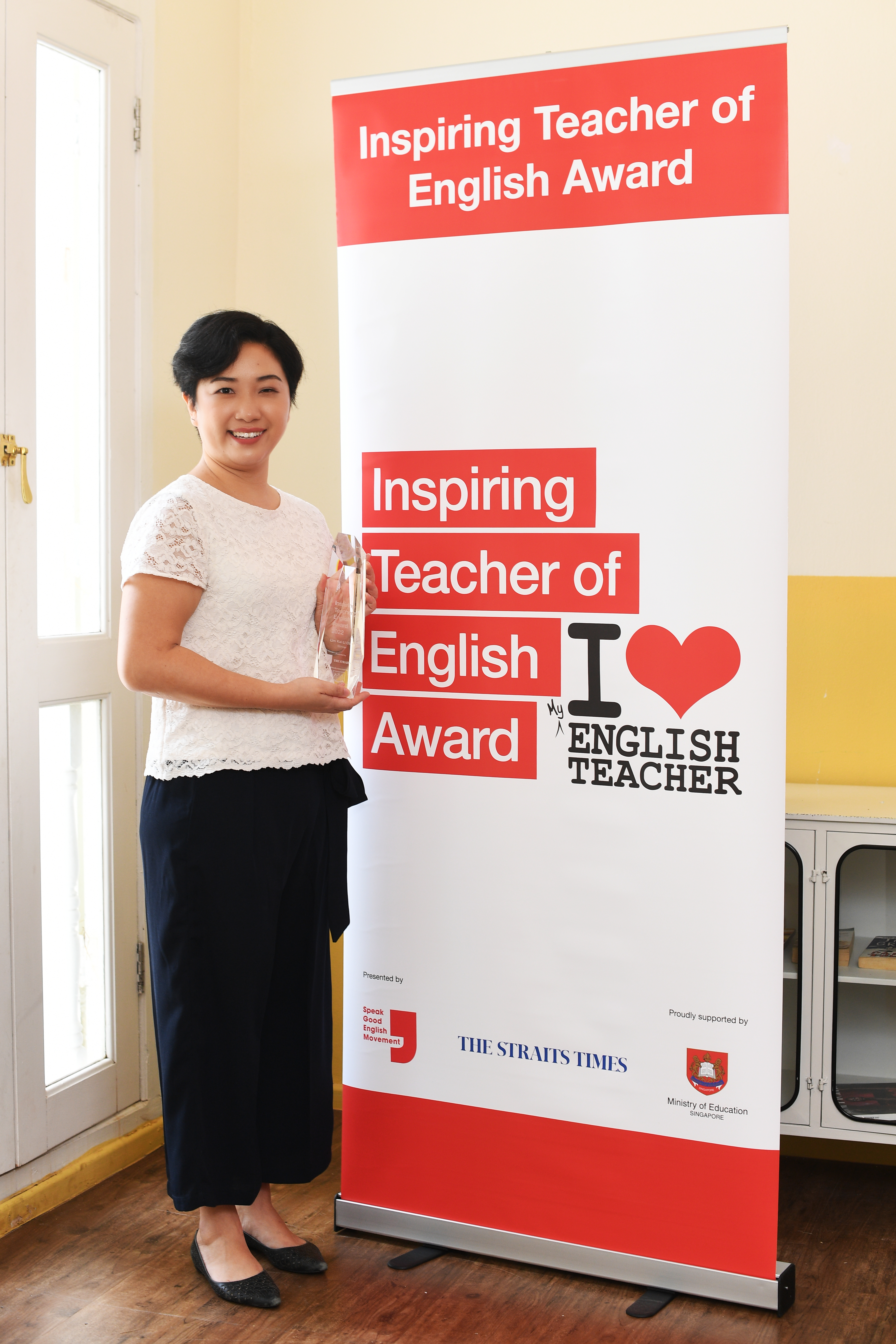
“All children can learn and, in time, communicate confidently. It was with this belief that I joined the teaching service over a decade ago and subsequently took up the appointment of HOD/EL. Having been a student in the Singapore education system, I have personally experienced how education serves as a social leveller. So I want to make a difference for the next generation by making learning accessible to all students, whatever their backgrounds.
I enjoy all of the following in my role – observing the bulbs in my students’ heads light up after they have understood a puzzling grammatical rule; seeing the pride creep into their faces after they have mastered a language skill; and witnessing the growth in them in the course of a year or more (be it in the use of the English language or in mindset changes) to become more independent, self-directed learners. This is what keeps me going year after year.
As an English Language teacher, I believe in letting my students understand the relevance of what I am teaching and how they can apply it in their daily lives. Through the stories I tell and their critical reflections on what they have learnt through their lessons, my students regularly consider how their learning in the English Language classroom can be applied in their daily lives.
The famous proverb, ‘No man is an island’, perfectly encapsulates my modus operandi as a leader of English Language teachers. I always strive to develop a good understanding of the people on my team and leverage their different strengths to offer rich learning experiences for our students. It is only when I learn from my experienced teachers, harness the enthusiasm of my beginning teachers, and understand the perspectives of all that I can lead our team to move as one towards our goal of developing the love for the English language in our students.”
Watch Video
Secondary School Category
Ms Teo Mei Chin, Betsy
Crescent Girls’ School
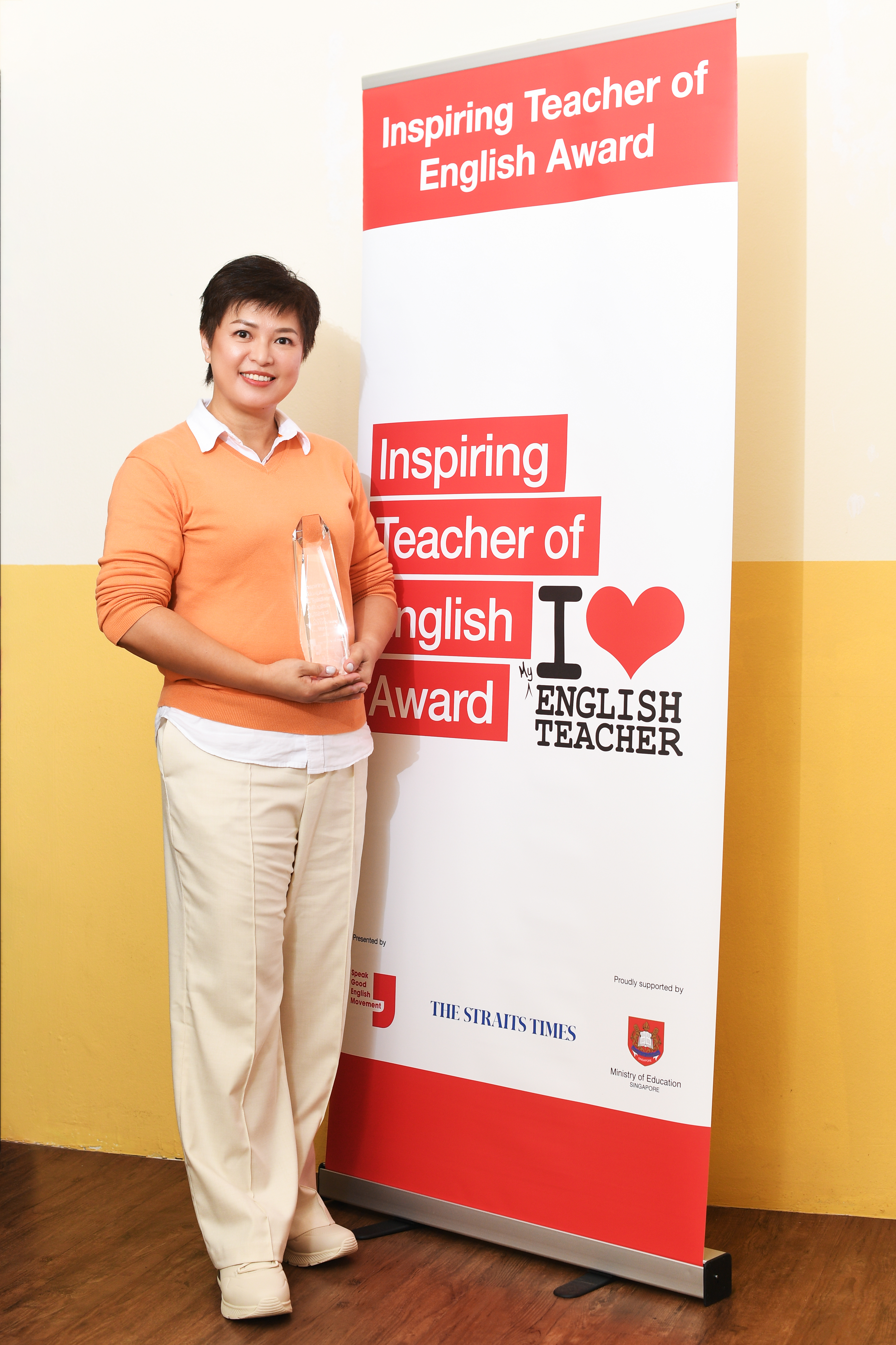
“Everyone can grow and must grow – this is the basic belief that has kept me grounded in my profession. The world of English that I live in and that I invite my students into is one that helps us grow because we use it to process ideas and articulate our thoughts and feelings. Through listening and reading, we find out that we are not alone in our experiences. Through speaking and writing, we can offer our ideas and voice on issues that we are passionate about. Hence, I encourage my students to grow and find their place in the world during my English lessons through listening, reading, speaking and writing.
I pride myself as a task-oriented teacher leader who nevertheless develops people-oriented plans. A firm believer of Servant Leadership, I serve my team so that they can meet the needs of the students under their charge. My observations of my colleagues’ strengths and their areas for growth, as well as my mentoring conversations with them, guide my planning and leadership. I also keep track of the new areas of work and learning that my colleagues undertake over the years so that they can both manage their work demands and enjoy their learning. I consider this the humanising touch I bring to my interactions with my colleagues.”
Watch Video
Ms Sarah Chia Hui’E
Chung Cheng High School (Main)
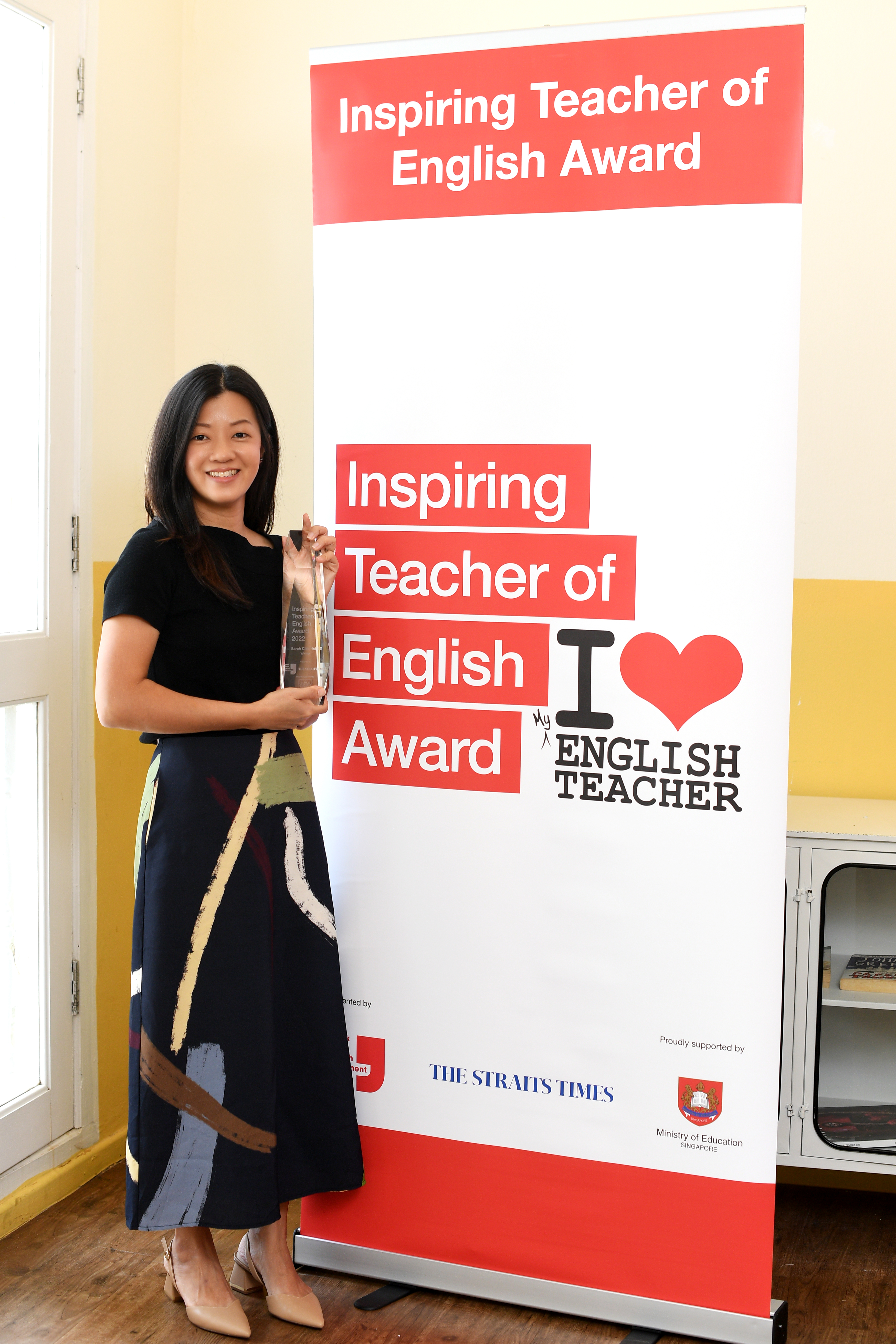
“I love words and I teach to inspire the same love in my students. I do this through involving my students in analysing good writing. This can be the work of acclaimed writers but, more crucially, I often choose my own students’ work. Through guiding my students’ analysis of their own and their peers’ writing, I enable them to uncover gems in their work. This inspires the belief that they, too, can write and wield words skilfully. In my lessons, I also show my students how English is alive and woven into our everyday lives. They discover to their delight that the joy of English is in the use of puns that they see in memes or advertisements, and the nuances of tone, diction and punctuation in text messages.
Teaching English is a privilege as I have been able to bond with my students through their expressions of self in their work. It has provided opportunities for me to understand them and to engage them in conversations about their aspirations, struggles, fears and views on real-world issues.
As a leader of my English Language teachers, I encourage them to imbue in their students a love for learning beyond examinations and classrooms. I guide them in conceptualising authentic opportunities for students to apply the knowledge and skills they have developed through their English Language and Literature lessons. At the same time, recognising that it is vital to sustain and feed my teachers’ passion, I design opportunities for us to nurture their love for their craft through discussing, writing and reflecting on texts and pedagogy.”
Watch Video